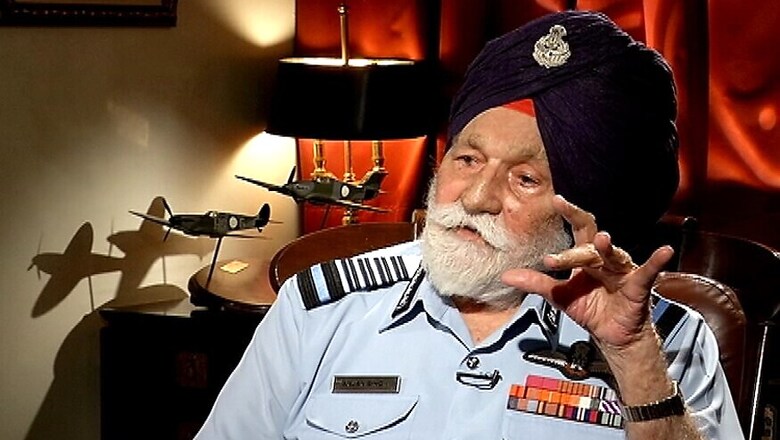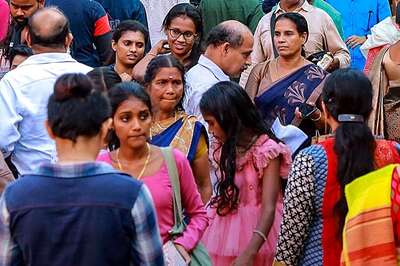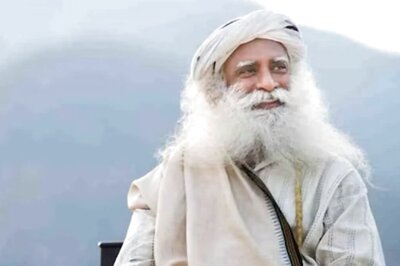
views
New Delhi: War hero Marshal Arjan Singh, who led the Indian Air Force during the 1965 India-Pakistan conflict, died on Saturday evening after suffering a cardiac arrest. He was 98.
Singh, the only officer of the IAF to be promoted to five-star rank, equal to a Field Marshal in the Army, was admitted to the Army's Research and Referral hospital this morning after he suffered a cardiac arrest, the defence ministry said.
The team of doctors monitoring him said he breathed his last at 7.47pm.
Prime Minister Narendra Modi, Defence Minister Nirmala Sitharaman and the three Service chiefs - General Bipin Rawat, Admiral Sunil Lanba and Air Chief Marshal Birender Singh Dhanoa – had visited Singh at the hospital in the evening.
In a series of tweets, PM Modi paid a tribute to the war hero and said India would never forget his contribution.
India mourns the unfortunate demise of Marshal of the Indian Air Force Arjan Singh. We remember his outstanding service to the nation. pic.twitter.com/8eUcvoPuH1— Narendra Modi (@narendramodi) September 16, 2017
“My thoughts are with his family and those mourning the demise of a distinguished air warrior and fine human, Marshal of the IAF Arjan Singh. RIP,” he wrote.
Recounting his meeting with Singh some time ago, Modi said that despite his ill health, Singh got up to salute him despite being told not to. “Such was his soldier discipline,” said Modi.
“India will never forget the excellent leadership of Marshal of the IAF Arjan Singh in 1965, when the IAF saw substantial action. His determined focus on capacity building in the IAF added great strength to our defence capabilities,” the PM tweeted.
President Ram Nath Kovind also expressed his condolence at the demise of Singh.
Marshal of the IAF Arjan Singh was a WW II hero & won our nation's gratitude for his military leadership in 1965 war 2/2 #PresidentKovind— President of India (@rashtrapatibhvn) September 16, 2017
Former President Pranab Mukherjee remembered him as an “outstanding soldier who led from the front, a diplomat and an administrator” as he joined the nation in mourning the loss.
More tributes continue to pour in for Singh, an icon of the country's military history, who had led a fledgling IAF in the 1965 Indo-Pak war when he was just a 44-year-old.
As Pakistan launched its Operation Grand Slam with an armoured thrust targeted at the vital town of Akhnoor in Jammu and Kashmir, he led the IAF through the war with courage, determination and professional skill.
The fighter pilot, who inspired the IAF despite constraints on the full-scale use of air combat power, was awarded the Padma Vibhushan, the second highest civilian honour, in 1965.
Born on April 15, 1919, in Lyallpur in Punjab in undivided India, his father, grandfather and great grandfather had served in the cavalry.
Educated at Montgomery, British India (now in Pakistan), he had joined the RAF College, Cranwell in 1938 and was commissioned as a Pilot Officer in December the following year.
He was the IAF chief from August 1, 1964 till July 15, 1969. Field Marshals Sam Manekshaw and K M Cariappa of the Army were the two other officers with a five-star rank.
After his retirement from the air force, Singh was appointed as the India's Ambassador to Switzerland in 1971 and concurrently served as the Ambassador to the Vatican.
He was also the High Commissioner to Kenya in 1974. Singh served as a member of the National Commission for Minorities and was also the Lieutenant Governor of Delhi. He was made Marshal of the Air Force in January 2002. The fighter aircraft base at Panagarh in West Bengal was named in his honour on his birthday last year.



















Comments
0 comment